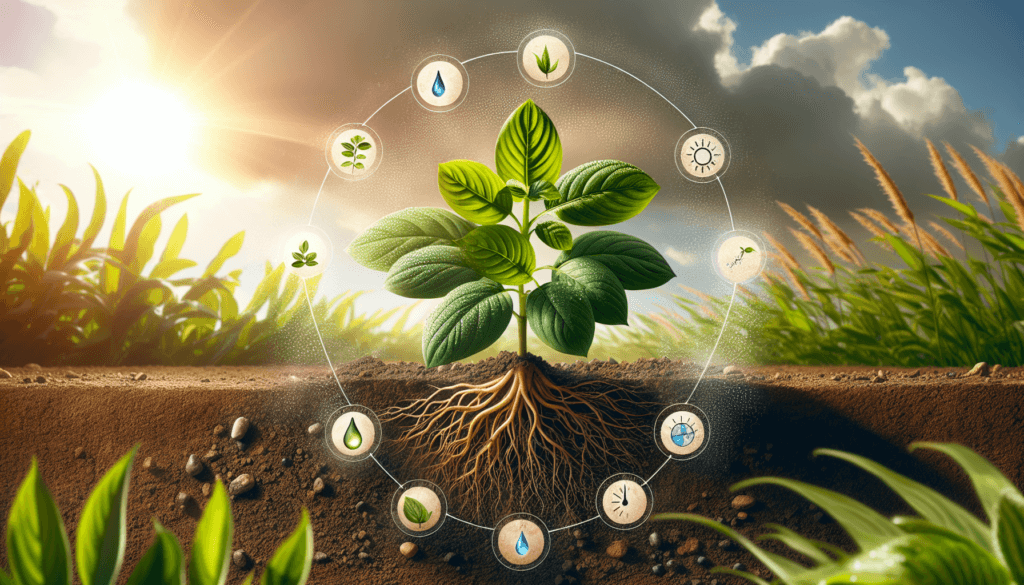Have you ever wondered what exactly plants need in order to grow and thrive? Well, we’ve got all the answers for you! In this article, we will unravel the mystery behind the seven essential things that plants need to flourish. From sunlight to water and nutrients, we will explore each element and its significance in the growth process. So, if you’re curious about cultivating a green thumb or simply want to understand the secret to a bountiful garden, keep reading to discover the key ingredients that plants cannot live without. Get ready to unlock the secrets of successful plant growth and become an expert in nurturing your leafy companions! Plants are incredible organisms that have the unique ability to convert sunlight into food through a process known as photosynthesis. However, in order for plants to thrive and reach their full potential, they require certain key factors in their environment. Here, we will explore the seven essential things that plants need to grow and flourish: water, light, air, temperature, nutrients, soil, and space.
Water
Water is the lifeblood of plants, playing a vital role in every aspect of their growth and development. When it comes to watering, it’s important to strike the right balance. Plants require a sufficient amount of water for their cells to function properly, but overwatering can lead to root rot and other issues. It’s crucial to provide plants with enough water to keep their cells turgid and hydrated, ensuring proper nutrient absorption and photosynthesis.
Absorption
Water is not only important for hydration but also for nutrient absorption. Through their root system, plants are able to absorb essential minerals and nutrients dissolved in water from the soil. This enables plants to maintain their health, support growth, and produce energy. Without proper absorption of nutrients, plants can suffer from stunted growth, nutrient deficiencies, and overall weakness.
Transportation
Water also plays a crucial role in the transportation system within plants. Through a process called transpiration, where water evaporates from the leaves, plants are able to draw up water and nutrients from their roots to every part of their system. This transportation system is essential for delivering important substances to where they are needed, such as sugars for growth and hormones for development.

Light
Light is another fundamental factor that significantly influences plant growth. Through photosynthesis, plants harness the energy from sunlight to produce sugars and other organic compounds. This process takes place in the chloroplasts, which contain chlorophyll, the pigment responsible for capturing light energy. Without sufficient light, photosynthesis cannot occur optimally, leading to weak, pale, and underdeveloped plants.
Photosynthesis
Photosynthesis is the process by which plants convert light energy into chemical energy, producing glucose and oxygen as byproducts. This energy is then used for various functions, including growth, reproduction, and defense. It’s important to note that different plants have varying light requirements. Some plants thrive in direct sunlight, while others prefer shade or diffused light. Understanding the light preferences of your plants is crucial for their successful growth.
Light Intensity
Apart from the presence of light, its intensity also has a significant impact on plant growth. Intensity refers to the brightness or strength of the light reaching the plant’s leaves. Too much light intensity can cause damage to the plant’s delicate tissues, while too little light can result in weak, spindly growth. Finding the right balance and providing adequate light intensity for your plants is essential for their photosynthetic process and overall health.

Light Duration
In addition to light intensity, the duration of light exposure is crucial for regulating plant growth. Most plants require a specific period of darkness, known as the photoperiod, to initiate certain physiological processes, such as flowering and fruit production. The length of the photoperiod varies among plant species, with some requiring shorter or longer periods of darkness. Providing the right light duration for your plants will ensure their proper development and reproductive success.
Air
Air, specifically its composition, is an often-underappreciated requirement for plant growth. Plants rely on a balanced mixture of gases, particularly carbon dioxide and oxygen, to carry out their metabolic processes.
Carbon Dioxide
Plants require carbon dioxide (CO2) for photosynthesis, as it serves as a crucial raw material in the production of glucose and other carbohydrates. During photosynthesis, plants take in carbon dioxide from the air through tiny openings called stomata, mainly located on the leaves. By having an abundant supply of carbon dioxide, plants are able to optimize their photosynthetic process and produce the energy they need to thrive.

Oxygen
Just as humans and animals need oxygen to survive, plants also require oxygen (O2) for their metabolic functions. Oxygen is involved in the cellular respiration process, where plants convert stored sugars into usable energy. Additionally, oxygen is crucial for root respiration, enabling the roots to absorb nutrients efficiently. Proper oxygen levels in the soil and good airflow around the roots are paramount for healthy plant growth.
Respiration
Respiration is the process through which plants convert stored sugars and oxygen into energy. It occurs in every cell of the plant and is essential for growth, reproduction, and various metabolic functions. However, excessive respiration can lead to oxygen depletion, reduced energy output, and impaired growth. Maintaining an appropriate balance between respiration and other plant processes is necessary for optimal growth and development.
Temperature
Temperature plays a significant role in regulating plant growth and development. While different plants have varying temperature preferences, there are certain factors to consider for plants to thrive.

Optimal Range
Each plant species has an optimal temperature range within which they can flourish. This range varies depending on the plant’s origin and climate adaptability. It’s crucial to determine the ideal temperature for the specific plants you are growing and provide suitable conditions. Extreme temperatures can stunt growth, alter reproductive processes, and even lead to plant death.
Extreme Temperatures
Extreme temperatures, either too high or too low, can have detrimental effects on plant growth. Excessive heat can cause dehydration, wilting, and scorching of leaves, while extreme cold can lead to frost damage, tissue death, and inhibited growth. Providing protective measures, such as shade structures or frost covers, can help mitigate the impact of extreme temperatures and ensure plant survival.
Seasonal Variations
Seasonal variations in temperature have a significant impact on the growth patterns of plants. Many plants have specific temperature requirements for germination, growth, flowering, and dormancy. Understanding and accommodating these seasonal temperature changes is crucial for successfully growing and nurturing plants throughout the different stages of their life cycle.

Nutrients
Nutrients are essential elements that plants require in varying quantities for their growth and development. They are divided into two main categories: macronutrients and micronutrients.
Macronutrients
Plants require macronutrients in large quantities for major physiological processes. These include nitrogen (N), phosphorus (P), potassium (K), calcium (Ca), magnesium (Mg), and sulfur (S). Macronutrients play key roles in the formation of proteins, energy production, cell division, and overall plant health. Maintaining a proper balance of macronutrients in the soil through fertilization is crucial for optimum plant growth.
Micronutrients
While plants require micronutrients in smaller quantities, they are equally essential for healthy growth. Micronutrients include iron (Fe), manganese (Mn), copper (Cu), zinc (Zn), molybdenum (Mo), boron (B), and chlorine (Cl). These nutrients are involved in various enzymatic reactions, photosynthesis, and overall nutrient uptake and utilization. A deficiency or excess of micronutrients can lead to nutrient imbalances, visible symptoms, and reduced plant productivity.
Fertilizers
Sometimes, the natural soil composition may not provide all the necessary nutrients for optimum plant growth. In such cases, the use of fertilizers can help supplement the nutrient requirements. Fertilizers provide an additional source of macronutrients and micronutrients, thus supporting healthy plant growth. However, it’s essential to follow the proper application rates and methods to avoid overfertilization, which can harm plants and the environment.
Soil
The quality and composition of the soil significantly impact the growth and overall health of plants. Understanding the key aspects of soil is vital for successful plant cultivation.
Soil Composition
Soil is composed of various particles, including sand, silt, and clay, along with organic matter and a mix of minerals. The composition of these particles affects soil texture, drainage capabilities, and nutrient-holding capacity. Different plants have varying preferences for soil composition, with some preferring well-draining sandy soils, while others thrive in moisture-retentive clay soils. Understanding the soil composition and providing suitable conditions will greatly contribute to plant growth.
Drainage
Proper soil drainage is crucial for plant growth, as it ensures adequate oxygen supply to the roots and prevents waterlogging. Excessively saturated soils can lead to oxygen deprivation, root rot, and reduced nutrient absorption. The ideal soil structure allows water to percolate through while retaining enough moisture for the plants to access. Ensuring proper drainage through techniques such as raised beds or amending the soil can significantly improve plant performance.
pH Level
The pH level of the soil determines its acidity or alkalinity and directly influences nutrient availability. Different plants thrive at different pH levels, so it’s important to understand the pH requirements of the plants you are growing. Most plants prefer a slightly acidic to neutral pH range, but some are adapted to thrive in more alkaline or acidic conditions. Adjusting the pH level through soil amendments can help create an optimal growing environment for your plants.
Space
Providing adequate space for plants is crucial for their root development, nutrient uptake, and overall growth.
Root Growth
Roots play a crucial role in the acquisition of nutrients and water from the soil. Without sufficient space to spread and grow, plants may experience stunted root development, resulting in reduced access to essential resources. Giving plants enough room for their roots to expand encourages healthy growth and enhances their ability to withstand environmental stressors.
Relieving Competition
Plants grown in close proximity often compete for resources such as light, water, and nutrients. This competition can result in weaker, less productive plants. Providing enough space between plants, known as adequate plant spacing, reduces competition and promotes optimal growth and yield. It also improves airflow, reducing the risk of disease and pest infestation.
Plant Density
Plant density refers to the number of plants per unit area. Dense planting may be desirable in certain cases, such as with ground cover plants or crop rotations, to optimize resource use and minimize weed growth. However, overcrowding can lead to increased competition, reduced airflow, and disease spread. Striking the right balance and considering the specific requirements of your plants is essential when determining plant density.
In conclusion, plants require a harmonious combination of water, light, air, temperature, nutrients, soil, and space to grow and flourish. By understanding and providing these essential factors, gardeners and plant enthusiasts can create ideal environments for plants to thrive and reach their full potential. Remember, each plant has its unique requirements, so tailoring these factors to suit the specific needs of your plants will result in healthy, vibrant, and fruitful growth. Happy gardening!


